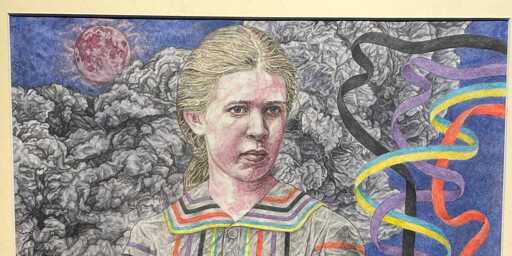This morning I ran a ten-kilometer race along a river: the Run for Freedom organized by the Kyiv School of Economics, on the banks of the Dnipro.
It is a dreamy site for a historian. Prehistoric settlements clustered along Ukraine’s rivers, which run south to the Black Sea. Humans six thousand years ago or more lived by fishing these rivers, as well as by gathering and hunting. They most likely would have run, as I was doing this morning with a thousand other people, in order to track down their prey. There must be a good reason why we humans, unless we are artificially sedentarized, are reasonably fast over long distances…
This morning I couldn’t get my music to play, so there was more headspace for such musing, and also more attention for seeing other people.
Ukraine trains the eye to see the body in a certain way. One of its universities, the Ukrainian Catholic University in Lviv, took as one of its founding missions the education of the physically disabled. Its expertise is relevant now, in this time of cruelty by distant weapons. At a gathering here in Kyiv I attended yesterday, the soldier sitting next to me had two prosthetic hands. A buddy of mine, whom I ran into after that, lost an eye in combat.
 Lesya Ukraïnka, portrait by the anarchist artist David Chichkan, on display at the Dnipro Center for Contemporary Culture. David was wounded in action on 9 August while repelling a Russian attack in the Zaporizhzhia region and died from his wounds the following day. Lesya, a very important Ukrainian writer, made a theme of her illness and limitations.
Lesya Ukraïnka, portrait by the anarchist artist David Chichkan, on display at the Dnipro Center for Contemporary Culture. David was wounded in action on 9 August while repelling a Russian attack in the Zaporizhzhia region and died from his wounds the following day. Lesya, a very important Ukrainian writer, made a theme of her illness and limitations.
A race like this morning’s 10k involves organizers and volunteers, including those posted along the path to offer hydration or encouragement. They hand out water or they clap. The route today was two 5k loops; the second time around I noticed something about one of the people cheering at the side of the track, who I assume was a volunteer (though perhaps she was just a running enthusiast). Her right hand was prosthetic. And the nails were painted a lovely dark red.
The Ukrainians have held off the Russian invasion by staying together. They are not superhuman, and they hurt, and they err, and they get weary, and they sometimes make bad decisions. But from the beginning, they have held off the destruction of their country by cooperating among themselves, working in groups, doing what the government could not always do, and in that way helping the government.
This race was run to raise awareness of Ukrainian soldiers held in Russian captivity and their families; it is just one small example of this sort of work. Some runners had been wounded, and quite a few were in active service.
The practical solidarity is a clue to how Ukrainians are defending themselves. And the painted nails are a hint as how they are living their lives.
Looking from the west, we tend to think of war as a movie, something that comes and goes quickly, where there is either absolute devastation or the quiet peace of final victory. But what I think I see, here in Ukraine, is something else, something essential: people who do what they are supposed to do, but who also want the beautiful and the whimsical in life, from life, the red nails, the extra coffee, the familiar song, the first poem, the more so because life’s edges are visible and its end is as familiar as the night.
Kyiv, 13 September 2025
Thinking about… is a reader-supported publication. To receive new posts and support my work, consider becoming a free or paid subscriber.
From Thinking about… via this RSS feed


